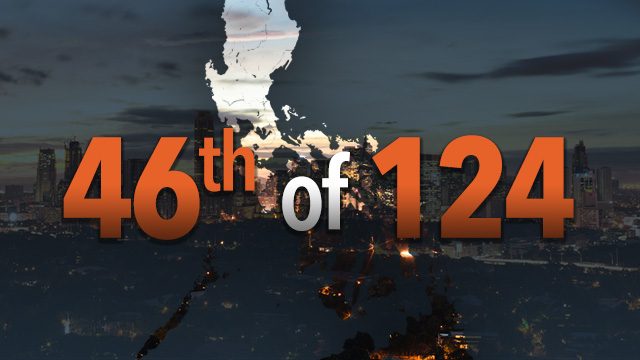SUMMARY
This is AI generated summarization, which may have errors. For context, always refer to the full article.


MANILA, Philippines – Of 124 countries worldwide, the Philippines ranks 46th with a score of 71.24 in terms of “optimizing” its human capital endowment.
This refers to “the skills and capacities that reside in people and that are put to productive use.”
According to the 2015 Human Capital Index, the Philippines “ranks in the mid-range of the overall Index scores” and failed to enter the 80% threshold in terms of “ability to nurture talent through education, skills development and deployment at all stages of the human life cycle.”
The Index is based on the 2015 Human Capital Report produced by the World Economic Forum (WEF) in collaboration with human resource consulting firm Mercer.
The report found that “a world where ‘nobody is left behind’ remains a distant prospect even in advanced economies.”
Released Wednesday, May 13, the 2015 Human Capital Report said the Philippines has best helped reach the maximum potential of its talent pool aged 15 to 24.
It ranked 20th in human capital development for the 15 to 24 age group.
Partly due to low primary education enrollment rates, however, the Philippines ranked relatively low at 76th in developing the talent of those aged below 15 years old.
The country ranked 51st, 40th, and 33rd in helping reach the potential of its talent base aged 25 to 54, 55 to 64, as well as 65 and above, respectively.
The first of its kind, the 2015 Human Capital Index “quantifies how countries are developing and deploying their human capital and tracks progress over time.”
The Index seeks to generate “better data and metrics” for setting labor-related targets, given the many forces affecting labor markets, said Klaus Schwab, founder and executive chairman of the World Economic Forum.
“Talent, not capital, will be the key factor linking innovation, competitiveness and growth in the 21st century, and governments, business leaders, educational institutions and individuals must each understand better the global talent value chain,” he explained.
Saadia Zahidi, co-author of the report, said the Index would support business leaders, policy-makers, civil society and the public in taking the informed, data-driven decisions that are needed to unlock human potential.
“The index shows that all countries – both rich and poor – have yet to optimize their human capital and calls for a new people-centric model of growth,” he added.
Measuring human capital development
In measuring human capital development, the WEF took into consideration the level of learning and employment of a country’s talent base.
Learning was measured by looking at enrollment in education, quality of education, educational attainment of those already in the labor force, and workplace learning.
Workplace learning pertains to “the level of opportunity in a country to acquire new skills both through formal on-the-job training as well as through learning-by-doing, tacit knowledge and learning from colleagues.”
Employment, on the other hand, was measured through the level of economic participation, skills, and vulnerability.
These two indicators – learning and employment – were then applied to 5 age groups: under 15, 15-24, 25-54, 55-64, and 65 and over.
Over all, Finland ranked first in the Index, with an 86% score. The top 5 countries which best optimized their talent base are:
- Finland
- Norway
- Switzerland
- Canada
- Japan
Only 14 countries reached the 80% score threshold on the level of education, skills and employment available to the talent pool.
While the 2014 World Talent Report measures a country’s “ability to develop, attract and retain talent to sustain a workforce for its existing industries,” the 2015 Human Capital Index looks at human capital across age groups.
“The generational lens sheds light on age-specific patterns of labor market exclusion and untapped human capital potential,” WEF explained in a statement.
Of the 60 countries included in the 2014 World Talent Report of Switzerland-based business school IMD, the Philippines’ ability to sustain its talent pool ranked 41st. The country was ranked 29th in 2013.
– Rappler.com
Add a comment
How does this make you feel?
There are no comments yet. Add your comment to start the conversation.